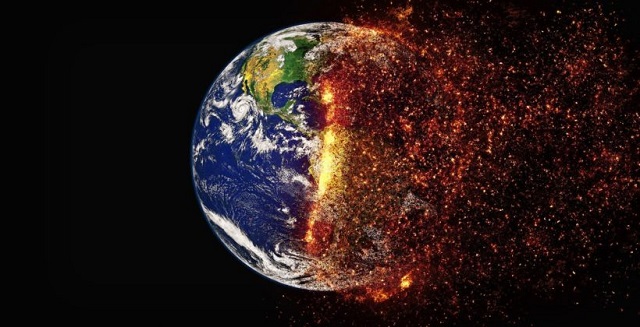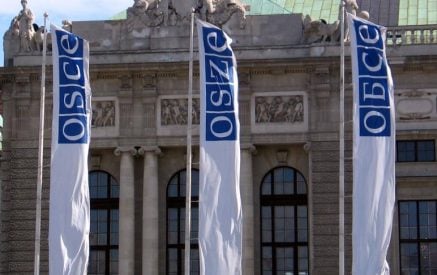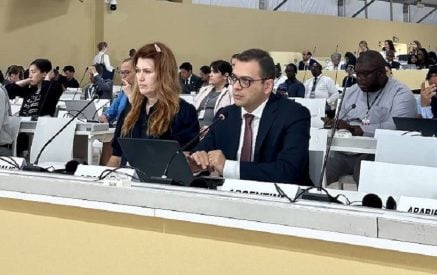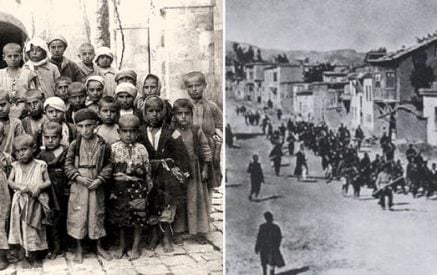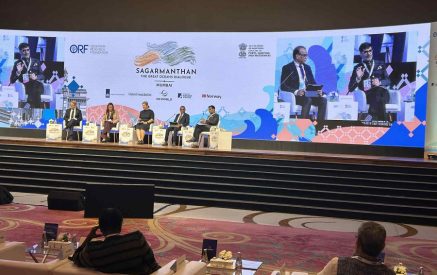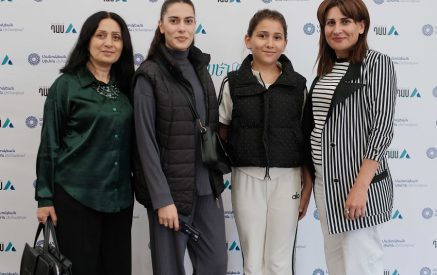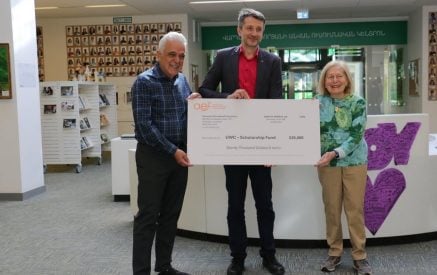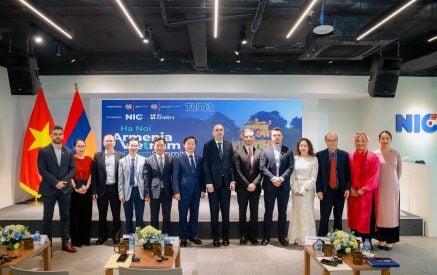A leading group of genocide scholars has warned that billions of people could die as a result of climate and ecological collapse. A statement published on Yom HaShoah (Holocaust Remembrance Day) by 24 leading genocide scholars and human rights practitioners posits that over and beyond soaring temperatures, the collapse of sustainable food production and the permanent waterlogging of densely populated regions could lead to the direct death of large swathes of humanity or their displacement to other regions where they would be physically prevented from entry.
The statement sees the onus of this breakdown falling on the poorest and most marginalised elements of the human community, especially in the Global South. It particularly highlights the vulnerability of indigenous peoples, otherwise frontline communities who continue to suffer the effects of fossil fuel and mining extraction. More generally, it links the coronavirus pandemic to an ‘ever increasing human disturbance to an already threadbare ecological balance’ and poses that the main drivers of this disturbance, most particularly powerful national and corporate polluting interests, should be accountable in the same way as others who commit crimes against humanity.
The scholars’ assessment leads them to call for an urgent paradigm shift in their own disciplinary field. Human induced catastrophes inflicted on the natural world, most obviously leading to global warming, also carry with them a vastly increased potential for pandemics as well as mass atrocity on a previously unforeseen scale. Even so, causation of these threats lies in a historical record in which ecocide and genocide are closely interlinked. Understanding these interconnections as well as acting with responsibility demands a major rethink of curricula and research priorities in the genocide field, an intensified scholars’ debate but also a more everyday focus on how scholars might be active proponents for a sustainable, non-violent future.
Taner Akçam, Armenian Genocide scholar and holder of the Robert Aram, Marianne Kaloosdian and Stephen and Marian Mugar Chair in Armenian Genocide Studies, told the Mirror-Spectator as background that he had been asking his colleagues at every occasion for around a year to put the “paradigm shift” on the agenda of their field. Mark Leven, who devoted his entire life to this subject and started a similar initiative in 2005, immediately agreed to this suggestion in a Zoom meeting and then took the lead to write the following statement.
Read also
Genocide Studies and the Climate Emergency: A Statement from Fellow Scholars
Genocide scholarship is underpinned by an implicit revulsion at the suffering, violence and degradation perpetrated by human beings against other human beings. Those of us who work in the field may deploy different methodologies, standpoints and frames of reference by which we seek to understand both the causes and consequences of mass violence as inflicted on whole groups of people across historical time. Implicitly, where not explicitly, we are impelled in what we do by a desire to live in a world where genocide and all such crimes against humanity have been consigned to the past.
This statement, as predicated on aspirations for a kinder, gentler commonwealth, is rendered inoperable, however, so long as we seek to ignore or avoid the biospheric crisis facing humankind. A generation on from when anthropogenic climate change became general knowledge, nearly all of human society – usually excepting those most directly involved either as earth science practitioners, or as environmental victims – have been too slow in recognising or acknowledging the far-reaching and destructive scale of the biogeochemical disruption as it will impact on our lives and wellbeing. The present coronavirus pandemic in these terms is simply a signal warning from nature reminding us that ever increasing human disturbance to an already threadbare ecological balance must in turn have severe consequences for ourselves. Yet the overall effect of human-induced planetary destablisation in coming decades will make of one singular zoonotic event a passing footnote. The bigger picture is one in which the thresholds allowing for our sustainable, cross-generational flourishing are in the process of being breached at an alarming and exponentially escalating rate. At the core of this ongoing ecological collapse is the rapid heating of the planet as a result of the vast quantities of fossil fuels some of us – primarily in the Global North – are burning and thus emitting as greenhouse gases into the atmosphere. The consequential breakdown of sustainable food production and the permanent salination or inundation of the land much of us inhabit, alongside the direct effects of soaring, unbearable temperatures, will lead to the displacement and death of hundreds of millions, if not billions of human beings. Yet this apocalypse in the making is not some unforeseen blip or caesura. On the contrary, its causes can be traced to the same forces which created the conditions for modernity, not least through colonial conquest and predation and with them the arrival of a hegemonic world system. The interrelationship thus between ecocidal and genocidal warfare, waged against peoples and planet is built into this anthropocenic turn.
But even for disciplinary scholars who might dispute or doubt such structural connections, the effects of the climate emergency on today’s most marginalised human communities should be ringing deafening alarm bells. With the sovereign nation-state still unquestionably the Westphalian centrepiece of contemporary, international societal architecture, the lack of cover, or safety-net for those who find themselves removed from any individual state’s ‘universe of obligation’ takes on, in conditions of environmental extremis, terrifying dimensions. Specific ‘problem’ groups denied or removed of equal citizen rights, where there is ostensibly, or genuinely, insufficient resources to share, simultaneously with, or alternatively to, the breakdown of state territorial integrity through inundation or desiccation, conjures up the spectre of tens, or hundreds of millions of refugees on the move. As such it poses the greatest humanitarian challenge of our – and indeed all – time. Logically the international nation-state system must give : borders, frontiers and walls unravelling to allow the dispossessed, starved and terrified refuge where safety and succour still allows. Yet the more likely scenario is the greater reinforcement of precisely such national state barriers, especially those of the Global North, and their ever more vigilant and lethal policing to prevent ingress, or indeed egress. The tsunami of violence which must necessarily follow will make of our studies of atrocities to date little more than way stations en route to a universal Calvary.
Facing the reality of where we have arrived, and the truth of what we are on the cusp of, is now beyond urgent. It requires, among other things, the most fundamental paradigm shift in the way we approach our disciplinary field. The challenge confronting us is threefold : as scholars, teachers and human beings.
As genocide scholars, we need to rethink what we study and why, not just with a view to the horrors of the past but the interconnections between that past and present, and why these interconnections matter to our fate as a global society, not to say species. Above all we need to ask why climate change, as with the pandemic, is impacting ‘first and worst’ on the most exposed and vulnerable, on people of colour, primarily in the Global South, on the rural as well as urban poor, on subsistence, nomadic and pastoralist societies, the dispossessed and displaced from war zones but also indigenous peoples, otherwise First Nations, everywhere. Those in particular who in the past have suffered and continue to suffer in terms of health, mortality, and quotidian violence the most searing toxic and polluting effects of fossil fuel and mining extraction, or otherwise the systemic degradation, dispossession, displacement and psychic numbing which comes with the structural violence inherent in a world where principles of social as ecological justice do not carry to those who most need them, are today aptly named as frontline communities. Yet the study of genocide in its legitimate concern to identify perpetrators has to date only rarely included in its roll call those most responsible for the ongoing structural as well as ecocidal violence visited upon such communities. The field’s primary focus on a range of totalitarian, fascistic and authoritarian social formations and their state actors has not been wrong. But in effectively reading genocide as some extraordinary aberration from a dominant, liberal, supposedly rules-based norm, it has elided the systemic, embedded violence which is at that liberal order’s own heart. The fact that rarely, or at least insufficiently have we chosen to interrogate trans-national corporate businesses, or their lead players as perpetrators, may be a function, in significant if possibly sub-conscious part, of the way all of us in wealthy societies are compromised through the benefits we derive as consumers from these corporates. But if that requires us to acknowledge our own complicity it certainly does not and cannot provide an excuse, as students of mass violence, to sit on our hands. As the clock ticks down to planetary nemesis our historically dispassionate role and critical distance seeking out the sources and drivers of both genocidal and ecocidal mass murder at macro, meso and micro levels, requires now a rapid, clear-sighted but also passionate reconfiguration to scrutinising and calling out the culpability and responsibility of immensely powerful, national and corporate polluting interests for the environmental damage and mass death they have inflicted and continue to inflict, and for which they ought to be accountable in precisely the same way as other more recognised génocidaires.
Equally, as teachers in the classroom, we cannot shirk responsibility from saying it as it is. We do not need to be environmental experts to tell the truth about the peril we face as a human community, nor to flinch from acting as role models in our efforts to educate and mobilise our students to act as if that truth were real. It is normative – implicitly if not explicitly – in genocide studies to encourage students to empathise, even identify with the victims of mass violence, and often to pay further attention to those who have acted as resisters and rescuers. The same surely should be true of what we might encourage of and enthuse to our students in the contemporary now. Equally, just as it is legitimate to show solidarity with those of the human family – again primarily and disproportionately in the Global South – most exposed to, and at risk from the ecological and hence epidemiological breakdown in train, it is also legitimate to encourage students to participate in and develop their own research on the national institutions, corporate and other economic forces, policies, practices, lead protagonists and cheer leaders who, directly or indirectly, are culpable for that breakdown and the endemic violence it engenders.
These imperatives finally extend to the way we live, work and act within and beyond the academy, that is, as members of family, community and society. Genocide studies has often made much of a distinction between perpetrators, victims and bystanders. But if we think of ourselves neither as perpetrators, nor victims, it is equally unconscionable that we might be bystanders in the face of what amounts to omnicide. This is not just a matter of the way we think through and change the practice of our collegial discourses, moving away, for instance, from repeated air travel for meetings and symposia to methods such as zoom whereby we operate within the carrying capacity of the planet. Nor is it either simply a matter of radically reducing our day to day carbon footprint in our homes, transport, holidays, or what we eat, wear and otherwise consume. To change, for ourselves, and as an example to others, also involves eschewing silence and instead calling out honestly and unequivocally the consequences of our ecocidal-cum-genocidal system. In short, we need to practice but also to preach in the manner not only of Raphael Lemkin but of that host of environmental visionary-practitioners of the ilk of Rachel Carson, Vandana Shiva, Wangari Maathai, Winona LaDuke and Greta Thunberg, who have done so holistically and with humility.
We have come at this twilight moment – perhaps already too late – to a fork in the road. As a human community we can from this point onwards carry on oblivious to the damage which our national and corporate-led systems are doing on the road to hell and perdition. Alternatively, we can repent our complicity and set ourselves instead on a different path towards healing between humans and other humans, and between humans and the natural world upon which our sustenance and species-sustainability depends. Genocide scholars cannot be exempt from this challenge. On the contrary, we have a signal role in it.
Taner Akçam, Kaloosdian/Mugar Chair in Armenian History and Genocide, Clark University.
Alex Alvarez, Professor, Department of Criminology & Criminal Justice, Northern Arizona University.
Donald Bloxham, Richard Pares Professor of History, University of Edinburgh.
Cathie Carmichael, Professor of European History, University of East Anglia.
Daniele Conversi, Professor, Ikerbasque Foundation for Science, Departamento de Historia Contemporánea, Universidad del País Vasco /University of the Basque Country.
Martin Crook, Lecturer in Sociology and International Relations, University of Roehampton.
Debórah Dwork, Director, Center for the Study of the Holocaust, Genocide and Crimes Against Humanity, The Graduate Center, City University of New York.
Kate Ferguson, Co-Executive Director, Protection Approaches and Chair of Policy, European Centre for the Responsibility to Protect, University of Leeds.
Adrian Gallagher, Associate Professor in International Security, Co-Director, European Centre for the Responsibility to Protect, University of Leeds.
Amos Goldberg, The Jonah M. Machover Chair in Holocaust Studies, The Hebrew University of Jerusalem.
Adam Jones, Professor of Political Science, University of British Columbia.
Thomas Kühne, Director, Strassler Center for Holocaust and Genocide Studies, and Strassler Colin Flug Professor of Holocaust History, Clark University.
Tony Kushner, Professor, Parkes Institute for the study of Jewish/non-Jewish relations, University of Southampton
Tom Lawson, Professor in History, Northumbria University.
Mark Levene, Emeritus Fellow, Parkes Institute for the study of Jewish/non-Jewish relations, University of Southampton.
Ben Lieberman, Professor of History, Fitchburg State University.
Dirk Moses, Frank Porter Graham Distinguished Professor of Global Human Rights History, University of North Carolina at Chapel Hill.
Emily Sample, Programs Director, The Fund for Peace, Washington DC.
Victoria Sanford, Professor of Anthropology, Lehman College, Doctoral Faculty, The Graduate Center, City University of New York.
Raz Segal, Associate Professor of Holocaust and Genocide Studies, Stockton University.
Damien Short, Professor, Human Rights Consortium, School of Advanced Study, University of
London.
Lyndsey Stonebridge, Professor of Humanities and Human Rights, University of Birmingham.
Mark Thompson, Reader in Modern History, University of East Anglia.
Jürgen Zimmerer, Professor of Global History, University of Hamburg.
8 April 2021
Photo Caption: (credit CC0 Public Domain)


















































